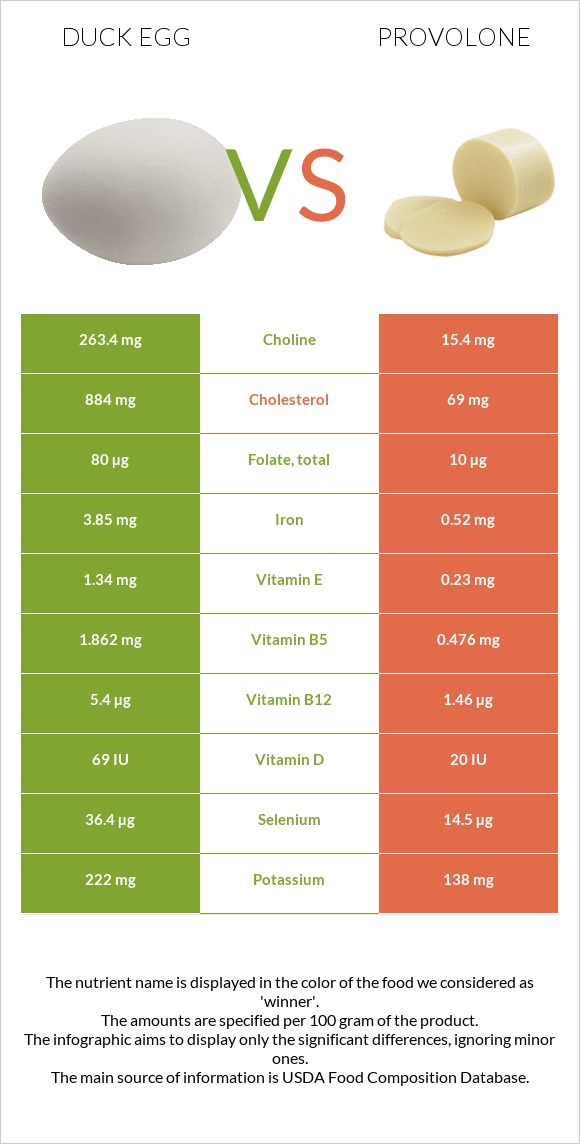Duck egg vs. Provolone — In-Depth Nutrition Comparison
Compare
Summary of differences between duck eggs and provolone
- Duck eggs have more vitamin B12, choline, iron, selenium, and vitamin B5; however, provolone is higher in calcium and phosphorus.
- Duck eggs cover your daily need for cholesterol, 272% more than provolone.
- Duck eggs have 17 times more choline than provolone. While duck eggs have 263.4mg of choline, provolone has only 15.4mg.
- Provolone has less cholesterol.
These are the specific foods used in this comparison Egg, duck, whole, fresh, raw and Cheese, provolone.
Infographic

Infographic link
Mineral Comparison
Mineral comparison score is based on the number of minerals by which one or the other food is richer. The "coverage" charts below show how much of the daily needs can be covered by 300 grams of the food.
| Contains more PotassiumPotassium | +60.9% |
| Contains more IronIron | +640.4% |
| Contains more CopperCopper | +138.5% |
| Contains less SodiumSodium | -83.3% |
| Contains more ManganeseManganese | +280% |
| Contains more SeleniumSelenium | +151% |
| Contains more MagnesiumMagnesium | +64.7% |
| Contains more CalciumCalcium | +1081.3% |
| Contains more ZincZinc | +129.1% |
| Contains more PhosphorusPhosphorus | +125.5% |
Vitamin Comparison
Vitamin comparison score is based on the number of vitamins by which one or the other food is richer. The "coverage" charts below show how much of the daily needs can be covered by 300 grams of the food.
| Contains more Vitamin EVitamin E | +482.6% |
| Contains more Vitamin DVitamin D | +240% |
| Contains more Vitamin B1Vitamin B1 | +721.1% |
| Contains more Vitamin B2Vitamin B2 | +25.9% |
| Contains more Vitamin B3Vitamin B3 | +28.2% |
| Contains more Vitamin B5Vitamin B5 | +291.2% |
| Contains more Vitamin B6Vitamin B6 | +242.5% |
| Contains more Vitamin B12Vitamin B12 | +269.9% |
| Contains more FolateFolate | +700% |
| Contains more Vitamin AVitamin A | +21.6% |
| Contains more Vitamin KVitamin K | +450% |
All nutrients comparison - raw data values
| Nutrient |  |
 |
DV% diff. |
| Cholesterol | 884mg | 69mg | 272% |
| Vitamin B12 | 5.4µg | 1.46µg | 164% |
| Calcium | 64mg | 756mg | 69% |
| Saturated fat | 3.681g | 17.078g | 61% |
| Choline | 263.4mg | 15.4mg | 45% |
| Iron | 3.85mg | 0.52mg | 42% |
| Selenium | 36.4µg | 14.5µg | 40% |
| Phosphorus | 220mg | 496mg | 39% |
| Sodium | 146mg | 876mg | 32% |
| Vitamin B5 | 1.862mg | 0.476mg | 28% |
| Protein | 12.81g | 25.58g | 26% |
| Fats | 13.77g | 26.62g | 20% |
| Folate | 80µg | 10µg | 18% |
| Zinc | 1.41mg | 3.23mg | 17% |
| Vitamin B6 | 0.25mg | 0.073mg | 14% |
| Vitamin B1 | 0.156mg | 0.019mg | 11% |
| Calories | 185kcal | 351kcal | 8% |
| Vitamin E | 1.34mg | 0.23mg | 7% |
| Vitamin D | 69 IU | 20 IU | 6% |
| Vitamin D | 1.7µg | 0.5µg | 6% |
| Vitamin B2 | 0.404mg | 0.321mg | 6% |
| Vitamin A | 194µg | 236µg | 5% |
| Copper | 0.062mg | 0.026mg | 4% |
| Magnesium | 17mg | 28mg | 3% |
| Polyunsaturated fat | 1.223g | 0.769g | 3% |
| Potassium | 222mg | 138mg | 2% |
| Vitamin K | 0.4µg | 2.2µg | 2% |
| Monounsaturated fat | 6.525g | 7.393g | 2% |
| Manganese | 0.038mg | 0.01mg | 1% |
| Net carbs | 1.45g | 2.14g | N/A |
| Carbs | 1.45g | 2.14g | 0% |
| Sugar | 0.93g | 0.56g | N/A |
| Vitamin B3 | 0.2mg | 0.156mg | 0% |
| Tryptophan | 0.26mg | 0.345mg | 0% |
| Threonine | 0.736mg | 0.982mg | 0% |
| Isoleucine | 0.598mg | 1.091mg | 0% |
| Leucine | 1.097mg | 2.297mg | 0% |
| Lysine | 0.951mg | 2.646mg | 0% |
| Methionine | 0.576mg | 0.686mg | 0% |
| Phenylalanine | 0.84mg | 1.287mg | 0% |
| Valine | 0.885mg | 1.64mg | 0% |
| Histidine | 0.32mg | 1.115mg | 0% |
Macronutrient Comparison
Macronutrient breakdown side-by-side comparison
| Contains more WaterWater | +73% |
| Contains more ProteinProtein | +99.7% |
| Contains more FatsFats | +93.3% |
| Contains more CarbsCarbs | +47.6% |
| Contains more OtherOther | +313.2% |
Fat Type Comparison
Fat type breakdown side-by-side comparison
| Contains less Sat. FatSaturated fat | -78.4% |
| Contains more Poly. FatPolyunsaturated fat | +59% |
| Contains more Mono. FatMonounsaturated fat | +13.3% |





